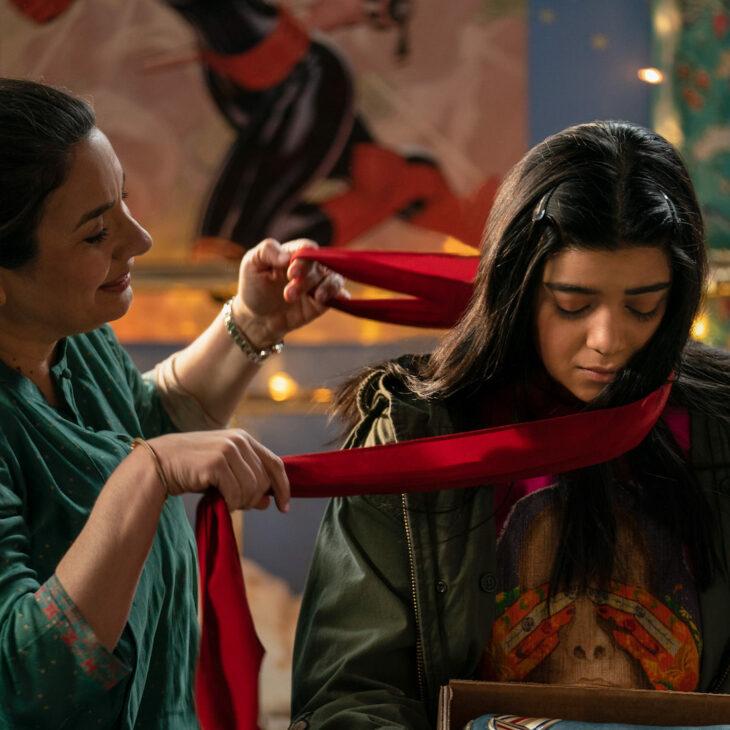
“My mom isn’t like Ms. Marvel’s mom … but my Nani is kind of overprotective like her,” Marwa explained to her best friend, Addison, while they watched the first episode of Disney’s Ms. Marvel during a playdate.
Marwa and I were about halfway through the series, and it had become our ritual to watch the episodes together – once with her brothers and me, and once just us two. I have been thinking about her observation to her friend as I watch the Ms. Marvel season again with the lens of motherhood, religion, and immigrants living in diaspora.
While my daughter may see herself reflected in Kamala’s character, my own association is more complex and conflicted. Being a first generation South Asian immigrant to the United States, I see parts of my own story and experience reflected in Kamala, and her mother, Muneeba. I also see the patterns of my own motherhood, and those of my mother and grandmother, in the three central female characters of the series, and the complicated relationships that they share with each other.
The interactions between Kamala and Muneeba in the early episodes of the series lean into the mother-daughter dynamics that many of us have navigated with our immigrant parents. When Kamala’s parents come into her room with matching Hulk salwar-khamees outfits for Kamala and her dad, the visceral embarrassment verbalized by Kamala and the deep disappointment felt by Muneeba are familiar to me on both sides – I have experienced those as a daughter and as a mother. However, it is the deeper primal disconnect between Kamala and Muneeba that is the center of this story. Showing us how even when we deeply love someone, it is possible to erect walls around our hearts that keep us from experiencing true intimacy with our beloveds.
This same dynamic of complicated parent-child love is also the center of Muneeba and Sana’s relationship. There is an awkward lack of understanding that stands between them, we witness it at the Karachi airport when Sana receives Muneeba, and we see it again in the tense exchanges between them at home. The eyes with which they see the world are inherently different – Sana anchors her self-knowledge and confidence in the eccentric reality of her own mother’s story, and Muneeba is uneasy and alienated by that same story which fuels her mother’s rich imagination.
The beauty of this mother-daughter relationship triangle is anchored in Kamala’s character – who is searching for meaning for her own experiences, and by proxy is also pushing her mother and grandmother on their own journeys of self-discovery and reconnection with one another. Kamala’s powers are brought to her by her great grandmother’s bangle, sent to her by her own grandmother, Sana. When the package carrying the bangle was first delivered to their home in America, Muneeba labels the box as “junk” and has it put away in the attic. This heirloom, passed down four generations, ultimately acts as the thread that binds these three women back into their familial bonds. For me, the bangle is a metaphor for story or memory, often mislabeled as junk or frivolous by those of us living in diaspora, who are trying to write new stories of their own belonging in alien lands. But perhaps our belonging does not come from compartmentalizing the experiences of our old and new homelands or generations, but rather from a weaving of narrative that binds the before with the present, thus creating a path for authentic belonging that is to come for the generations who follow.
In the penultimate episode of Ms. Marvel’s first season, we learn that Kamala is the reason a string of stars leads her young grandmother back to her father amid chaos during the partition of India and Pakistan. It is through Kamala’s magic, that a young Sana follows guiding lights back to safety. Kamala is cast back in time to witness the tribulations faced by her family, and her presence in the past secures their futures. I find comfort in this part of Kamala’s story because even though my daughter does not have magical powers and time-travel abilities, it is perhaps through her insight, on our past and present, that I will be able to understand the deeper truths of our family stories. And maybe, just maybe, I too will see the beauty in the broken pieces of our family story through Marwa’s eyes.
Share
Related Articles
American Civic Life
We Commemorate, We Commit: Out of Catastrophe, a Conversation on Connection and Repair
American Civic Life
Racial Equity



